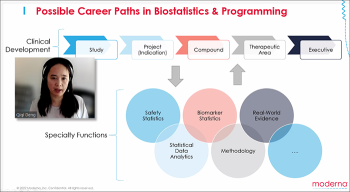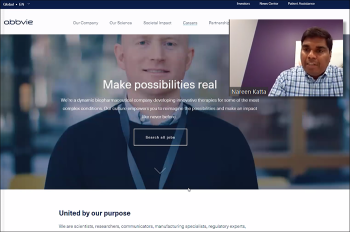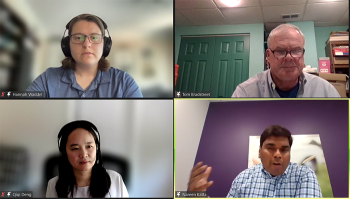


NISS hosted another Virtual Career Fair on Wednesday, June 15, 2022! This career fair brought together statisticians from the pharmaceutical industry to share their advice with prospective applicants and provided current opportunities for statisticians/data scientists from three companies in the pharmaceutical industry. (see Event page) Attendees were also given an inside look at the research that statisticians in these three companies get involved in.
During this pharmaceutical career fair, our panel included Qiqi Deng with Moderna, Nareen Katta with AbbVie, and Tom Bradstreet with Bristol-Myers Squibb. This session’s Moderator was Hannah Waddel, a Ph.D. student from the Biostatistics Department at Emory University as well as one of our NISS Graduate Student Network Executive Committee Members.
This career fair began with a brief presentation from Qiqi Deng highlighting career paths and opportunities in Moderna, followed by an overview of AbbVie by Nareen Katta. After these presentations, we continued the session as a panel discussion with Tom Bradstreet who further provided guidance on what is truly essential to new hires in the statistics or data science fields from his experience.
Qiqi Deng, the Director of the Biostatistics and Programming group at Moderna, discussed job opportunities during her presentation highlighting the type of work conducted at Moderna ranging from statistical data analytics, biomarker statistics, real world evidence analytics and safety statistics. Qiqi highlighted skills that would be needed, programming skills such as SAS, R, Shiny, simulations, etc. Besides statistical programming hard skills, it’s important to be familiar with data standards. One of the insights she shares with us is to:
“Have a statistical mindset and a thorough understanding of statistical models and methodology.”
- Qiqi Deng
Nareem Katta, the Senior Director and Head of Clinical Analytics at AbbVie, continues the session by providing an overview of opportunities at Abbvie. He showed the audience the areas that Abbvie works on using their website. His team at AbbVie was set up as an incubator about 4 or 5 years ago. They hire individuals within data science, robo-statistics, data analytics, or computer science backgrounds. AbbVie works with stakeholders who want to become more involved and to be a core partner. As such, the team has a mindset of being enthusiastic about working with stakeholders and a good compliment to a broader biometrics and statistics organization.
“As more and more data sources are becoming available, the stakeholder groups are becoming more data savvy and they are interested in getting their hands dirty, they want to explore, they want to be a core partner.”
- Nareem Katta
The team has expanded exponentially, currently having about 60 areas that they support. Nareem welcomes our audience to apply to the various positions they have at AbbVie and is enthusiastic to grow his team.
The pharma industry provides interesting and challenging career and research opportunities for statisticians and data scientists. Our panelists discussed the work in the pharmaceutical sector that potential applicants would like to know more about. Tom Bradstreet, the Director of Preclinical Biomarkers & Discovery Biostatistics at Bristol-Myers Squibb, leads the discussion about what kinds of coursework is important to carry over in this industry.
Questions during the panel arose pertaining to whether or not a student’s dissertation research topic is significant to the prospective role in a biostatistics position in the pharmaceutical industry. The panel discussed how common it is for recent PhD recipients to deviate from their dissertation research domains to biostatistics in pharma, and provided advice to PhD candidates looking to switch fields in the biomedical/biostatistician roles.
Another piece of advice from our panel pinpointed on the application process for internship positions for 2nd year Biostat PhD students if they haven't received any response. Key areas were highlighted on how these students could improve on their application process. One of the major factors that would help for instance, is networking. Getting to know other statisticians or people in the biostatistics field would give someone a leg up to be noticed and have a better chance at having their application be considered.
Tom Bradstreet informed our audience that conferences are one of the functions that would be wise to attend and partake in (as well as network) to get noticed by a company and to stay on their radar for when a student will be ready to apply.
“Some companies might see which students are developing in academic institutions, and determine which student is a good match. They might take mental notes and then keep them on our radar, who show great potential but need another year to gain the academic experience. These CVs can be saved for a position that comes up in the future.”
- Tom Bradstreet
As for experience, having internships whether in biotech companies (e.g. in healthcare devices or in healthcare service), or pharmaceutical research companies still gives someone real-world experience utilizing the skills required to succeed in either field. Internship experiences are learning experiences after all, and are oftentimes considered as helpful stepping stones for gaining knowledge in those fields.
“Don’t give up and maybe your internship program will be out there for you next year!”
- Qiqi Deng
Our panelists also provided insight on how the work culture at a pharma company differs from academia. It’s important to keep in mind that being accepted or denied while applying for a position is part of the learning process, gaining exposure and meeting some of the challenges of the status quo.
Nareem notes that the nice thing about the pharma industry is that the networks grow across many different companies, establish credibility and leadership.
“You may want to take advantage of leaders in company to grow network, and be productive, what are you getting out of it, learning experience”
- Nareem Katta
Companies might list opportunities on their websites stating that they are seeking an applicant with similar-related training and years of experience. Sometimes companies will leave these types of positions wide open for the kind of individual they want to hire.
“We want the intern to come not for a job but for the adventure, and that’s the kind of intern we’re looking for. As an intern, you want to make the most of the time that you’re there, make sure that you’re excited about the interaction and the opportunity, and if you’re not, then it’s probably not a good match.”
- Tom Bradstreet
For people who want to transfer from academia to pharmaceutical companies, our panel explained how they should prepare and what the expectations are from companies and hiring managers. Our panel also discussed examples of data science/machine learning techniques in the drug development process and other areas in pharmaceutical companies.
We thank all of our panelists, and our moderator for being part of this career fair and providing wonderful advice to everyone who joined in the audience.
Here are links to the opportunities from these three organizations highlighted in this pharma career fair:
AbbVie open positions
Moderna open positions
Bristol-Myers Squibb open positions
You may view the full recording of the career fair below on our NISS Communications YouTube Channel below:
